Thermal Energy Transfer
Boost Your Heat Pump Efficiency: Interactive Guide

Were you aware that enhancing the efficiency of your heat pump could cut down on your energy expenses by as much as 20%?
In this interactive guide, we will show you how to maximize the performance of your heat pump for optimal savings.
From understanding thermal energy transfer to utilizing advanced technologies, we will provide you with expert tips and tricks to boost your heat pump efficiency.
Get ready to save money and serve the environment with our comprehensive guide.

Key Takeaways
- Understanding thermal energy transfer mechanisms: conduction and convection
- Importance of choosing the right heat pump for maximum efficiency, considering factors like proper sizing, efficiency ratings, energy source, brand reputation, and professional installation
- Optimizing heat pump sizing for enhanced performance by using a heat pump sizing calculator and avoiding the consequences of oversized or undersized units
- Ensuring proper insulation for heat pump efficiency, including the advantages of different insulation types, the benefits of high-quality insulation for heat retention, and the importance of sealing air leaks
Understanding Thermal Energy Transfer in Heat Pumps
We can enhance our understanding of thermal energy transfer in heat pumps by exploring the key principles and processes involved.
Thermal energy transfer mechanisms play a crucial role in the efficiency of heat pumps. The two main mechanisms are conduction and convection.
Conduction involves the transfer of heat through direct contact between materials, while convection occurs when heat is transferred through the movement of fluids or gases.
Additionally, there are several factors that affect the efficiency of a heat pump. These include the type and quality of insulation, the size and design of the heat exchanger, and the overall system maintenance.

Choosing the Right Heat Pump for Maximum Efficiency
To ensure maximum efficiency, we need to carefully select and install the right heat pump for our specific heating and cooling needs. When it comes to heat pump installation, there are a few key factors to consider. Here are some guidelines to help you choose the most energy efficient model for your home:
-
Size: Make sure the heat pump is properly sized for your space. A unit that’s too small will struggle to heat or cool effectively, while an oversized unit may cycle on and off frequently, wasting energy.
-
Efficiency rating: Look for heat pumps with high SEER (Seasonal Energy Efficiency Ratio) and HSPF (Heating Seasonal Performance Factor) ratings. These indicate how efficiently the unit operates.
-
Energy source: Consider whether a ground source or air source heat pump is more suitable for your location and climate.

-
Brand reputation: Research reputable brands known for producing reliable and energy efficient heat pumps.
-
Professional installation: Trust a qualified HVAC professional to install your heat pump correctly, ensuring optimal performance and efficiency.
Optimizing Heat Pump Sizing for Enhanced Performance
Optimizing heat pump sizing is essential for enhancing performance and maximizing efficiency. Properly sizing your heat pump ensures that it can effectively heat or cool your space without wasting energy.
To determine the right size for your heat pump, you can use a heat pump sizing calculator. This tool takes into account factors such as the size of your home, insulation levels, climate, and desired indoor temperature to determine the appropriate size for your heat pump.

It’s important to note that oversized heat pumps can lead to short cycling, reduced energy efficiency, and increased wear and tear on the system. On the other hand, undersized heat pumps may struggle to adequately heat or cool your space, resulting in discomfort.
Ensuring Proper Insulation for Heat Pump Efficiency
When it comes to ensuring proper insulation for heat pump efficiency, understanding different insulation types and their benefits is key.
We’ll discuss the advantages of common insulation materials such as fiberglass, cellulose, and spray foam, and how they can improve heat retention in your home.
Additionally, we’ll provide DIY insulation tips for those who prefer a hands-on approach, as well as highlight the benefits of hiring a professional insulation service for optimal results.

Insulation Types and Benefits
We recommend using high-quality insulation to maximize our heat pump’s efficiency. Proper insulation is crucial for ensuring that the heat generated by the pump stays inside our homes, keeping us warm and comfortable. Here are some types of insulation materials and their benefits:
- Fiberglass: Offers good thermal performance and is cost-effective.
- Cellulose: Made from recycled materials, it provides excellent insulation and has a low environmental impact.
- Spray foam: Provides superior insulation and air sealing properties.
- Reflective insulation: Used in attics and walls to reflect heat away from the home during summer.
- Rigid foam: Highly effective in insulating foundations and basement walls.
When it comes to insulation installation, it’s important to hire professionals who have the knowledge and experience to ensure proper installation. This will maximize the effectiveness of the insulation and ultimately improve the efficiency of our heat pump.
DIY Insulation Tips
Our top priority is to ensure that our heat pump operates efficiently. One way we can achieve this is by implementing proper insulation.
DIY insulation techniques can help us optimize our home’s energy efficiency and reduce heat loss or gain.

When it comes to home insulation materials, there are several options available.
One popular choice is fiberglass insulation, which is affordable and easy to install.
Another option is cellulose insulation, made from recycled materials, which provides excellent thermal performance.
Spray foam insulation is also effective, as it creates an airtight seal, preventing drafts and reducing energy waste.

Additionally, sealing air leaks around windows, doors, and electrical outlets can significantly improve insulation.
Hiring Professional Insulation
To maximize our heat pump efficiency, it’s essential to regularly hire professional insulation services. Proper insulation is crucial for ensuring that our heat pump operates at its highest efficiency and reduces energy waste. When it comes to professional installation, there are a few key factors to consider:
- Expertise: Professional insulation contractors have the knowledge and experience to assess our home’s insulation needs accurately.
- Quality Materials: They use high-quality insulation materials that are specifically designed for optimal energy efficiency.
- Proper Installation: Professionals ensure that insulation is installed correctly, leaving no gaps or areas for heat to escape.
- Energy Savings: By having professional insulation, we can significantly reduce our energy bills and improve the overall comfort of our home.
- Long-term Benefits: Professional insulation helps prolong the lifespan of our heat pump and prevents potential issues in the future.
By investing in professional insulation, we can create a more energy-efficient home and maximize the performance of our heat pump.
Now, let’s explore another important aspect of increasing our heat pump efficiency: implementing smart thermostat technology for energy savings.
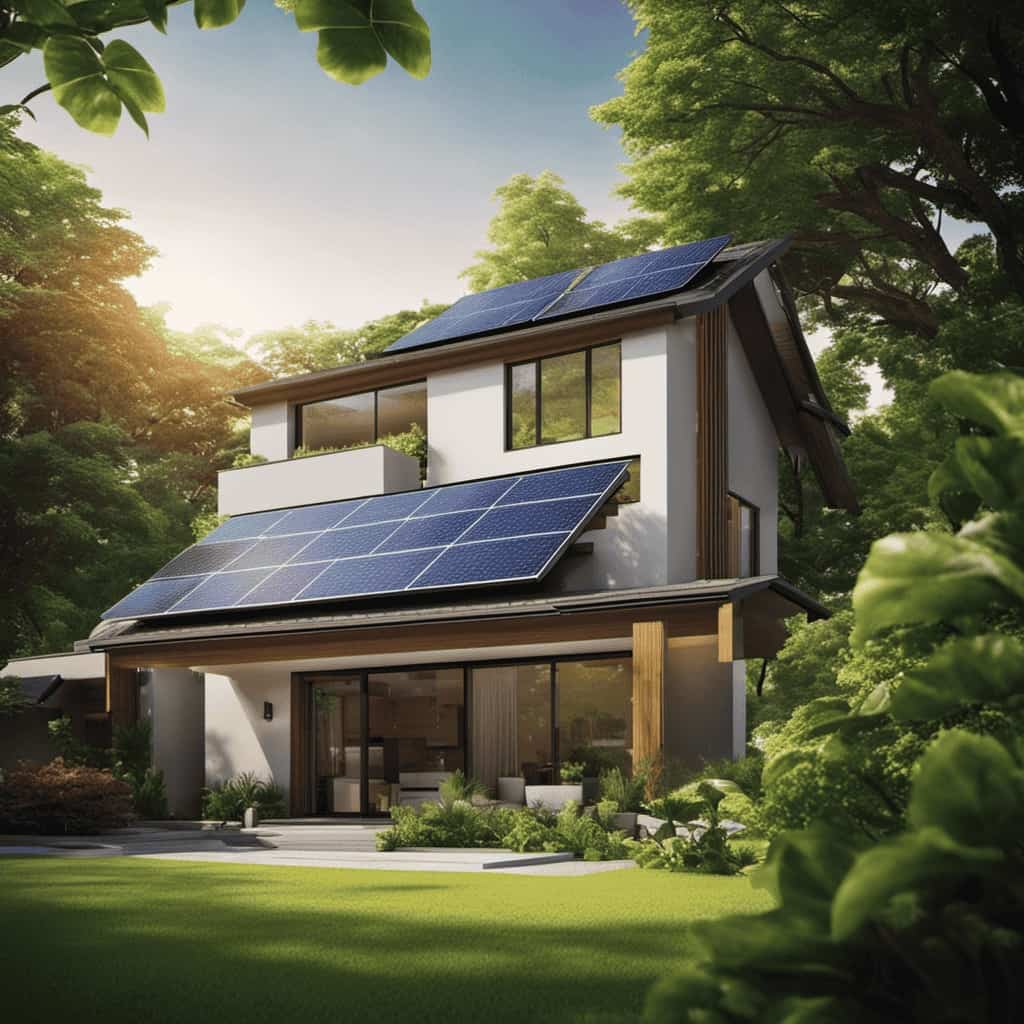
Implementing Smart Thermostat Technology for Energy Savings
Implementing smart thermostat technology can significantly improve the efficiency of your heat pump system.
Smart thermostats offer a range of benefits, including energy-saving features that can help reduce your energy consumption and lower your utility bills.
These thermostats are also cost-effective to install, making them a smart investment for homeowners looking to optimize their heat pump’s performance.
Benefits of Smart Thermostats
Smart thermostats offer numerous benefits, including significant energy savings and improved home comfort. By implementing smart thermostat technology, homeowners can take advantage of energy-saving features and experience the cost effectiveness of installation.
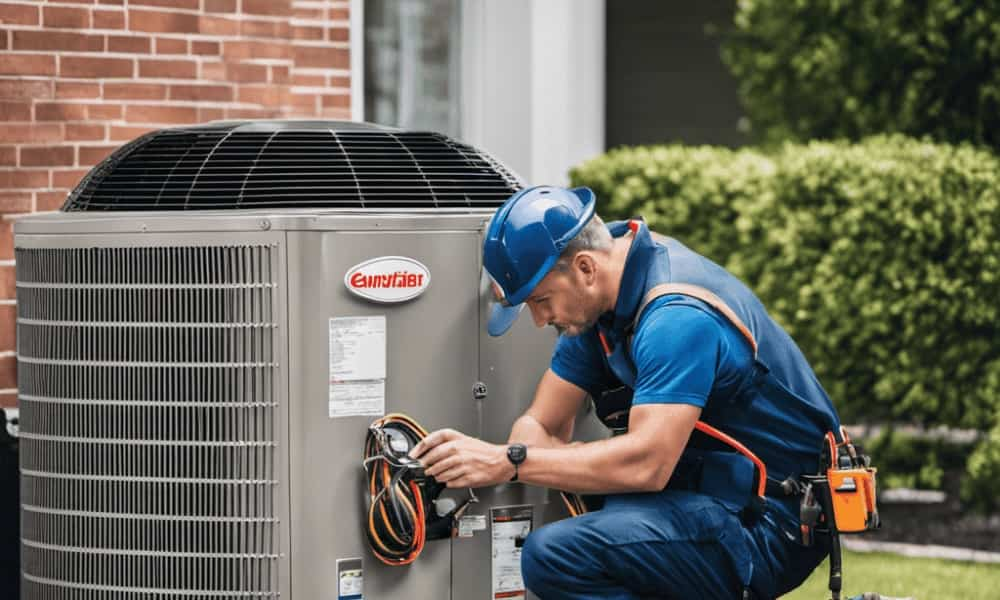
Here are five reasons why smart thermostats are a valuable addition to any home:
-
Energy efficiency: Smart thermostats use advanced algorithms to optimize temperature settings, reducing energy consumption and lowering utility bills.
-
Remote control: With a smart thermostat, you can adjust the temperature of your home from anywhere using your smartphone or tablet, ensuring comfort and energy savings even when you’re away.
-
Learning capabilities: These thermostats learn your schedule and preferences, automatically adjusting the temperature to maximize comfort and minimize energy usage.

-
Integration with smart home systems: Smart thermostats can be linked to other smart home devices, allowing for seamless automation and control.
-
Energy usage insights: Smart thermostats provide detailed energy usage reports, empowering homeowners to make informed decisions about their energy consumption.
Implementing a smart thermostat can greatly improve energy efficiency and enhance the overall comfort of your home, making it a wise investment for both your wallet and the environment.
Energy-Saving Features
By utilizing energy-saving features of smart thermostat technology, we can optimize our heat pump efficiency and reduce energy consumption. Smart thermostats offer a range of benefits that contribute to energy savings.

One of the key advantages is the ability to schedule temperature changes based on our daily routines. This means that the heat pump will only operate when needed, resulting in significant energy savings.
Additionally, smart thermostats can learn our preferences over time and adjust the heating and cooling settings accordingly. This ensures that our home is always comfortable without wasting energy.
Moreover, smart thermostats can be integrated with other smart home devices, such as sensors and occupancy detectors, to further enhance energy efficiency.
Cost-Effectiveness of Installation
Installing a smart thermostat for energy savings can be a cost-effective solution for improving heat pump efficiency. By implementing smart thermostat technology, you can optimize your heating and cooling system, saving both energy and money. Here are five key benefits of installing a smart thermostat:
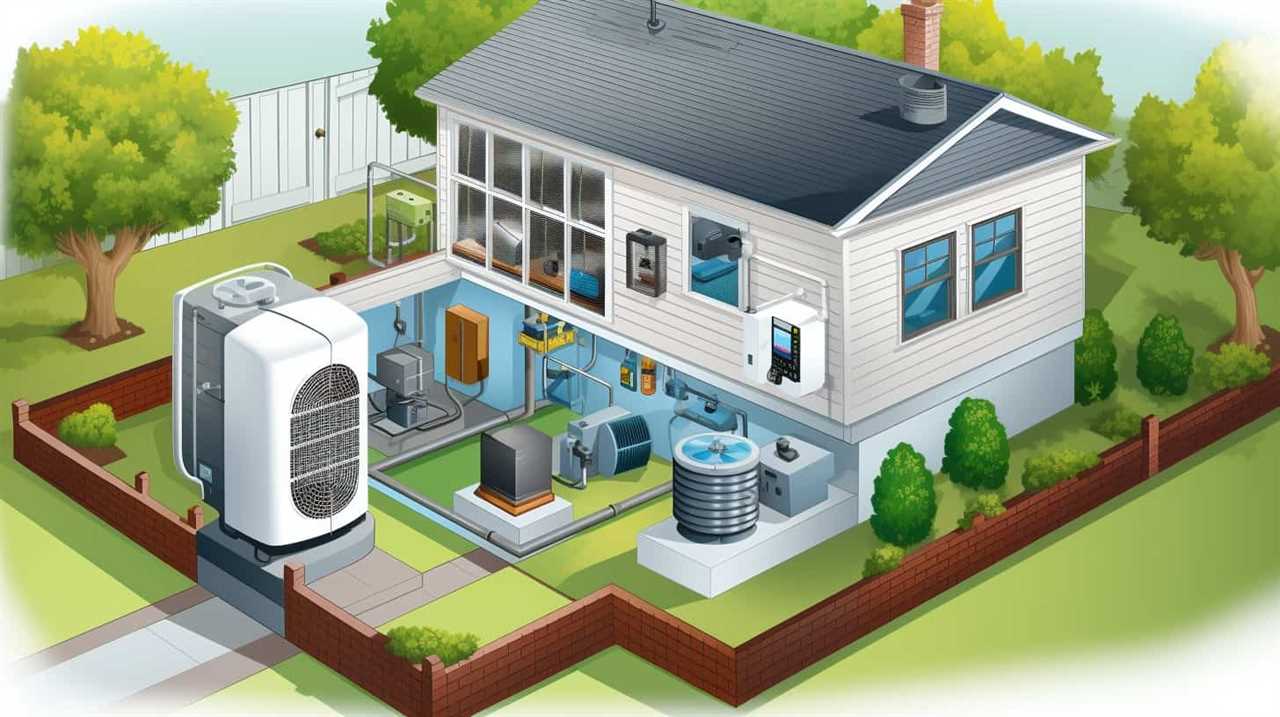
-
Energy savings: A smart thermostat allows you to set temperature schedules and adjust settings remotely, ensuring that you only use energy when needed.
-
Increased comfort: With a smart thermostat, you can customize temperature settings to suit your preferences, ensuring a comfortable living environment.
-
Improved efficiency: Smart thermostats continuously learn your heating and cooling patterns, automatically adjusting settings to maximize efficiency.
-
Remote control: With smartphone integration, you can control your thermostat from anywhere, allowing you to make adjustments even when you’re not at home.

-
Return on investment: While the initial cost of a smart thermostat may be higher, the energy savings and increased efficiency can lead to significant long-term savings, providing a positive return on investment.
Implementing a smart thermostat is a practical and rewarding energy-saving tip that can help you achieve better heat pump efficiency and save money in the long run.
Regular Maintenance for Improved Heat Pump Efficiency
Regular maintenance is essential for improving the efficiency of our heat pump. By regularly inspecting and servicing our heat pump, we can ensure that it operates at its optimal performance, saving us energy and money in the long run. To help you stay on top of your heat pump maintenance, here is a regular maintenance checklist:
| Maintenance Task | Frequency | Benefits |
|---|---|---|
| Clean or replace air filters | Every 1-3 months | Improves air quality and efficiency |
| Check and clean outdoor coils | Twice a year (spring and fall) | Prevents dirt buildup and enhances heat transfer |
| Inspect and lubricate fan motor | Annually | Extends lifespan and reduces energy usage |
| Check refrigerant levels | Annually | Ensures proper heat exchange and efficiency |
| Test thermostat accuracy | Annually | Avoids temperature discrepancies and energy waste |
Exploring Geothermal Heat Pump Options for Greater Efficiency
Let’s take a closer look at the geothermal heat pump options available to us for achieving greater efficiency. When it comes to geothermal heat pump installation, there are several options to consider.

Here are some benefits of choosing geothermal heat pumps:
- Energy efficiency: Geothermal heat pumps are highly efficient and can save you up to 50% on your energy bills.
- Environmental friendliness: These systems use the constant temperature of the earth to heat and cool your home, reducing your carbon footprint.
- Long lifespan: Geothermal heat pumps can last up to 25 years, providing you with reliable and consistent heating and cooling.
- Quiet operation: Unlike traditional HVAC systems, geothermal heat pumps operate quietly, creating a more peaceful and comfortable environment.
- Low maintenance: With fewer moving parts, geothermal heat pumps require less maintenance, saving you time and money.
Utilizing Solar Energy to Boost Heat Pump Efficiency
To maximize our heat pump efficiency, we can enhance it by utilizing solar energy through harnessing the power of the sun. Solar panel integration is a great way to achieve this.
By installing solar panels on the roof or in the yard, we can generate electricity from sunlight and use it to power our heat pump. This reduces our dependence on the electrical grid and helps to lower our energy bills.
In addition, heat pump hybrid systems can be used to combine the power of solar energy with traditional heating methods. These systems use solar energy during the day and switch to a backup heating source at night or during periods of low sunlight.

This integration of solar energy into our heat pump system improves efficiency and reduces our carbon footprint.
Evaluating Advanced Heat Pump Technologies for Optimal Performance
We can assess the effectiveness of various advanced heat pump technologies to achieve optimal performance. When evaluating heat pump performance, it’s important to consider the following advanced technologies:
- Variable-speed compressors: These compressors allow for more precise temperature control and greater energy efficiency.
- Enhanced coil design: Coils with improved heat transfer capabilities maximize the heat pump’s performance.
- Intelligent controls: Smart controls optimize system operation by adjusting settings based on weather conditions and occupancy patterns.
- Two-stage compressors: These compressors provide better efficiency by adjusting the capacity according to the heating or cooling demand.
- Heat recovery systems: These systems capture waste heat from the cooling process and use it for water heating or other purposes, increasing overall energy efficiency.
Frequently Asked Questions
How Does the Understanding of Thermal Energy Transfer in Heat Pumps Affect the Efficiency of My Heat Pump?
Understanding thermal energy transfer is key to heat pump efficiency. It directly impacts the performance of your heat pump. By comprehending how thermal energy is transferred, you can optimize your system for maximum efficiency and savings.
What Factors Should I Consider When Choosing the Right Heat Pump for Maximum Efficiency?
When choosing the right heat pump for maximum efficiency, we consider factors such as heat pump capacity and energy efficiency standards. These play a crucial role in ensuring optimal performance and cost savings.
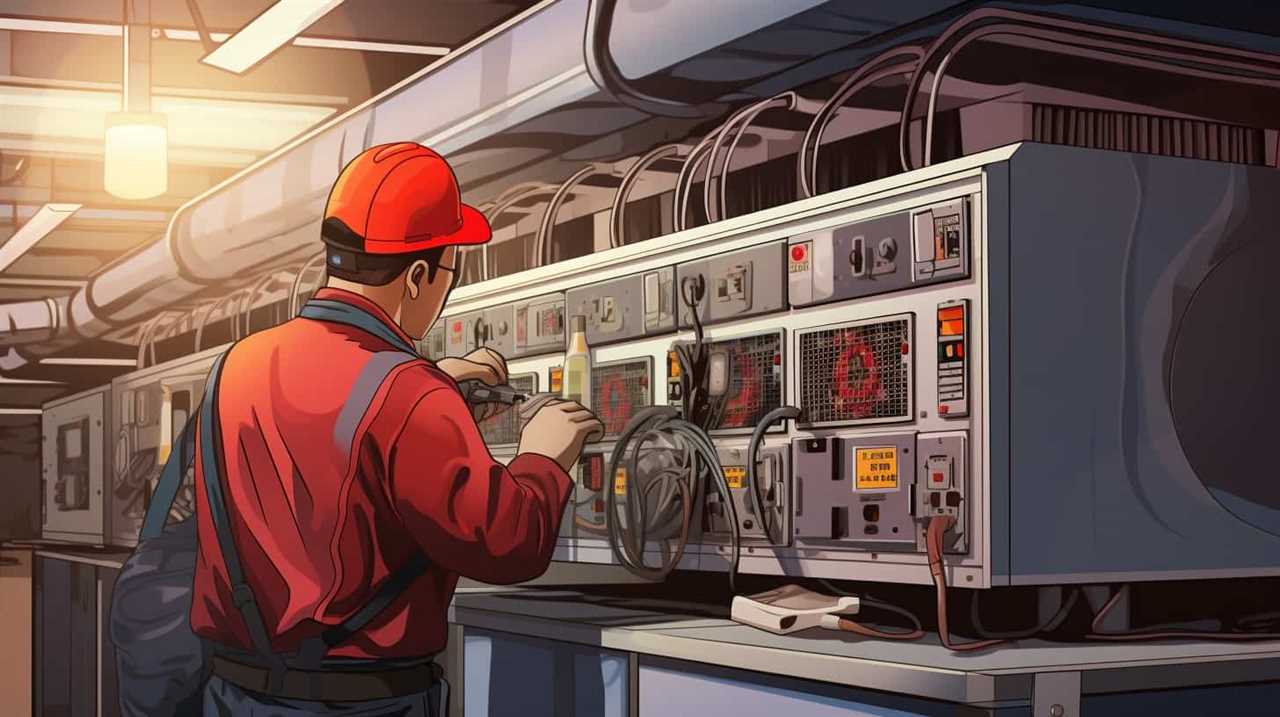
How Does Optimizing Heat Pump Sizing Enhance the Performance of the System?
Optimizing heat pump sizing is crucial for maximizing performance. Finding the right balance between cost and performance ensures efficiency. Additionally, considering the impact of climate on heat pump efficiency helps enhance system performance.
Why Is Proper Insulation Important for Heat Pump Efficiency?
Proper insulation is essential for heat pump efficiency. It helps minimize heat loss or gain, ensuring optimal performance. By using high-quality insulation materials, we can create a more efficient and comfortable indoor environment while saving energy and reducing utility costs.
How Does Implementing Smart Thermostat Technology Contribute to Energy Savings With Heat Pumps?
Implementing smart thermostat technology contributes to energy savings with heat pumps by allowing us to easily program temperature settings and adjust them remotely. This helps optimize energy usage and reduce wastage, resulting in lower utility bills and increased efficiency.
Conclusion
In conclusion, maximizing heat pump efficiency is crucial for reducing energy consumption and lowering utility costs. By understanding thermal energy transfer, choosing the right heat pump, optimizing sizing, ensuring proper insulation, implementing smart thermostat technology, and regularly maintaining the system, homeowners can significantly improve their heat pump’s performance.
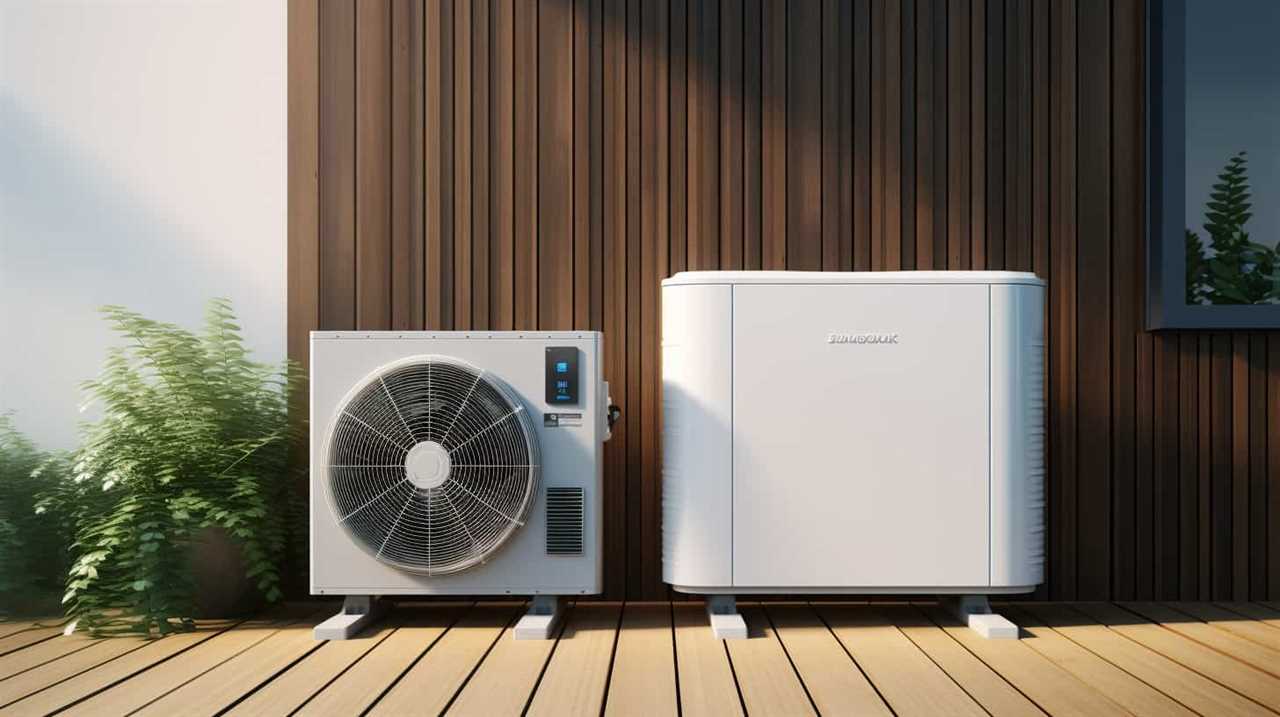
For example, a case study conducted in a residential building demonstrated that by upgrading to a high-efficiency heat pump and implementing smart thermostats, the homeowner was able to reduce their energy consumption by 30% and save $500 annually.
Thermal Energy Transfer
Boost Heat Pump Efficiency: Renewable Energy’s Unexpected Power

Are you prepared to unleash the complete capabilities of your heat pump? Search no more! In this article, we will delve into the surprising impact of renewable energy on enhancing heat pump effectiveness.
Get ready to revolutionize your heating system as we delve into the role of solar energy, harnessing geothermal power, the game-changing wind energy, sustainable biomass solutions, and the untapped potential of hydropower.
Prepare to master the art of maximizing heat pump performance with the help of renewable energy sources.
Key Takeaways
- Solar panel integration allows for the direct conversion of sunlight into electricity, reducing reliance on traditional power sources.
- Geothermal energy can maximize heat pump performance by providing heat stored beneath the Earth’s surface, leading to higher levels of efficiency.
- Wind power can revolutionize heat pump efficiency by generating electricity to power heat pumps, reducing their carbon footprint.
- Biomass combined with heat pump technology greatly enhances efficiency and sustainability, reducing reliance on fossil fuels and emitting fewer greenhouse gases.
The Role of Solar Energy in Enhancing Heat Pump Efficiency
We can enhance heat pump efficiency by utilizing solar energy. Solar panel integration plays a crucial role in harnessing renewable energy for heat pumps. By connecting solar panels to heat pump systems, we can directly convert sunlight into electricity, reducing reliance on traditional power sources. This integration allows heat pumps to operate more efficiently, as they can draw power from the solar panels during daylight hours.
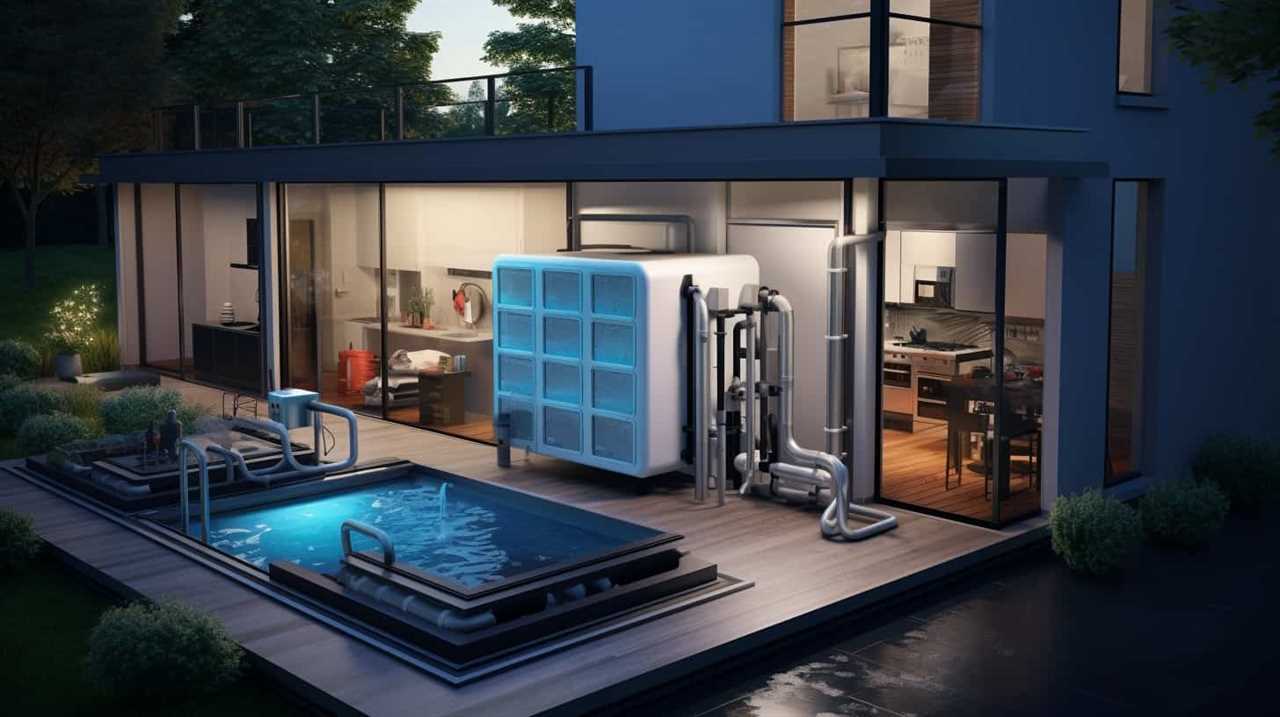
Additionally, energy storage solutions can further optimize heat pump performance. Storing excess solar energy in batteries or other storage systems ensures a continuous power supply for heat pumps, even when sunlight is limited.
This combination of solar panel integration and energy storage solutions maximizes the utilization of renewable energy, significantly improving heat pump efficiency.
Harnessing Geothermal Power to Maximize Heat Pump Performance
One way to maximize heat pump performance is by harnessing the power of geothermal energy. Geothermal energy is heat that is stored beneath the Earth’s surface in geothermal reservoirs. This heat can be extracted and used to provide heating and cooling for buildings. Geothermal innovations have made it possible to tap into this renewable energy source and optimize the efficiency of heat pumps.
By utilizing geothermal energy, heat pumps can achieve higher levels of efficiency compared to traditional heating and cooling systems. The table below illustrates the advantages of harnessing geothermal power for heat pump performance:
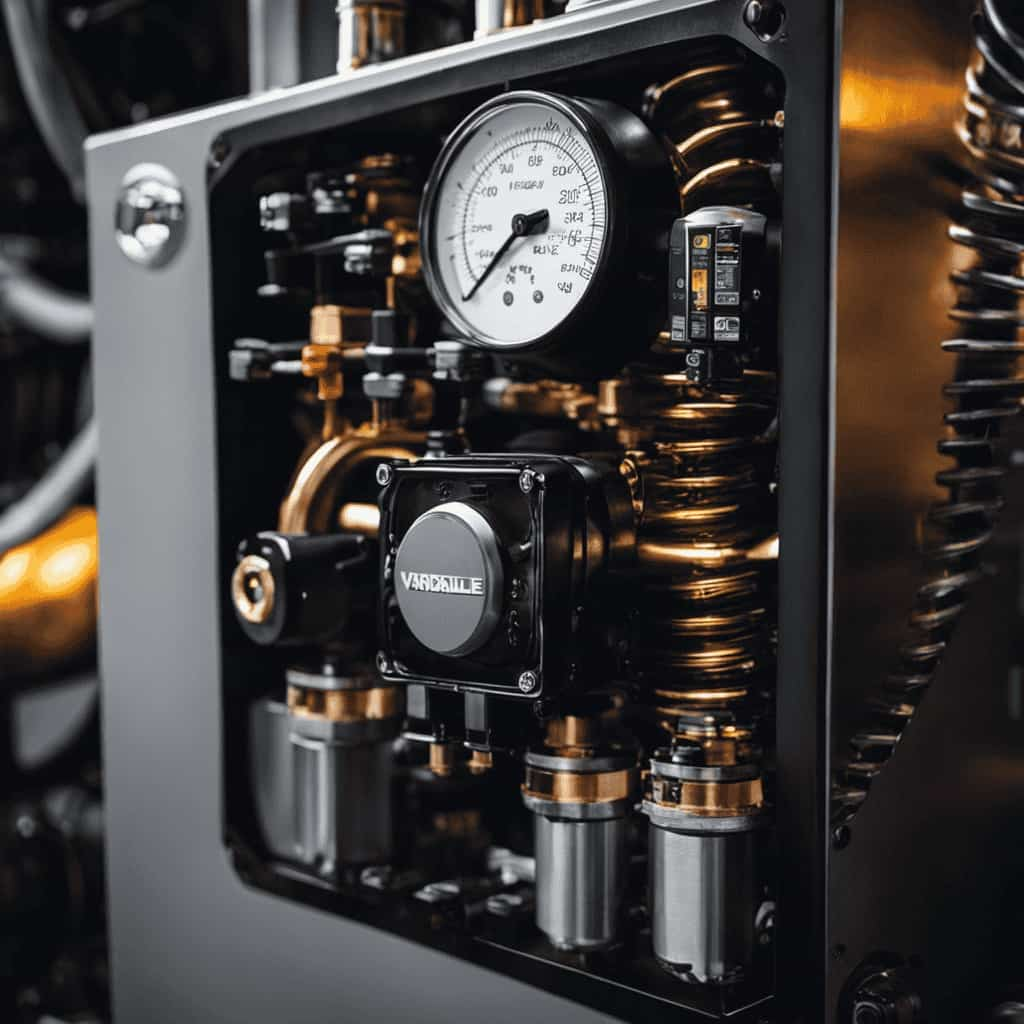
| Advantages of Geothermal Power for Heat Pump Performance |
|---|
| Higher efficiency |
| Reduced energy consumption |
| Lower operating costs |
| Environmentally friendly |
Harnessing geothermal power not only improves the performance of heat pumps but also contributes to a more sustainable and energy-efficient future. By utilizing the abundant geothermal resources available, we can maximize the efficiency of heat pumps and reduce our carbon footprint.
Wind Energy: A Game-Changer for Heat Pump Efficiency
Harnessing wind energy can revolutionize heat pump efficiency.
Wind energy has the potential to be a game changer for heat pump technology, offering significant benefits to renewable energy solutions.
By utilizing wind power to generate electricity, heat pumps can operate more efficiently and reduce their carbon footprint.

Wind turbines can produce large amounts of electricity, which can be used to power heat pumps, allowing them to operate at higher efficiencies.
Additionally, wind energy is a clean and renewable source, making it an environmentally friendly option for heat pump systems.
The integration of wind energy into heat pump technology enhances the overall performance and sustainability of these systems.
Biomass: A Sustainable Solution for Boosting Heat Pump Efficiency
Using biomass as a renewable fuel source and combining it with heat pump technology can greatly enhance efficiency and sustainability. Biomass, which refers to organic materials such as wood, agricultural residues, and dedicated energy crops, offers a promising alternative fuel for heat pumps. By harnessing the energy stored in biomass, heat pumps can provide a reliable and efficient heating solution while reducing reliance on fossil fuels. The innovative combination of biomass and heat pump technology allows for a more sustainable heating system that emits fewer greenhouse gases and decreases overall energy consumption. To illustrate the potential benefits of this approach, consider the table below, which compares the energy efficiency and carbon emissions of biomass-powered heat pumps to conventional heating systems.
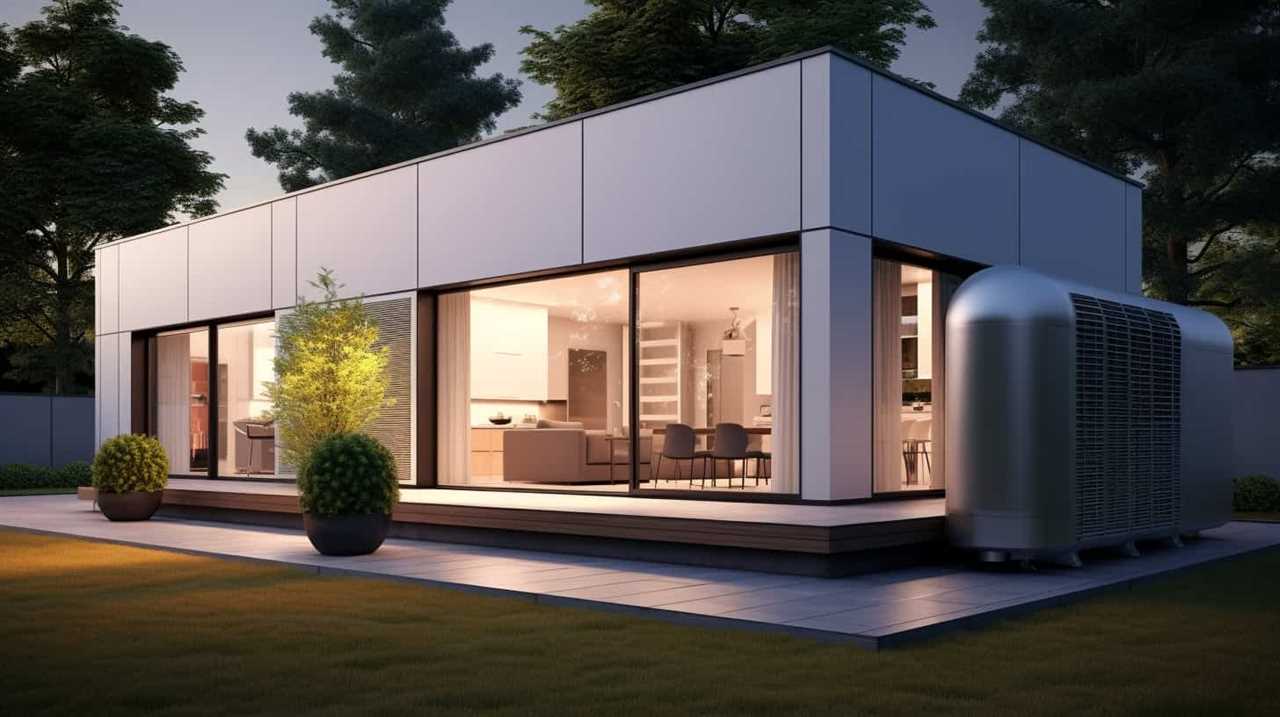
| Heating System | Energy Efficiency (COP) | Carbon Emissions (kgCO2/MWh) |
|---|---|---|
| Biomass Heat Pump | 4.5 | 10 |
| Natural Gas Boiler | 0.9 | 200 |
| Oil Boiler | 0.85 | 250 |
| Electric Resistance | 1 | 500 |
| Air-Source Heat Pump | 3 | 60 |
As shown in the table, biomass heat pumps have a significantly higher energy efficiency and lower carbon emissions compared to other heating systems. This makes them an attractive and sustainable solution for boosting heat pump efficiency.
Hydropower: Unleashing the Potential of Water to Improve Heat Pump Performance
We can maximize heat pump performance by tapping into the immense potential of hydropower, using water as a renewable energy source. Hydropower, also known as hydroelectric power, offers several advantages in improving heat pump efficiency.
- Water Efficiency:
- Hydropower utilizes the natural flow of water, harnessing its kinetic energy to generate electricity.
- This process doesn’t consume water, making it a highly water-efficient energy source.
- Heat pumps can benefit from this water efficiency by leveraging hydropower for their operations, reducing overall water consumption.
- Hydroelectric Power:
- Hydropower plants can generate a significant amount of electricity, providing a reliable and consistent power source for heat pumps.
- The scalability of hydropower allows for large-scale generation, accommodating the increasing demand for heat pump installations.
- By integrating hydropower into heat pump systems, we can enhance their performance and contribute to a more sustainable and efficient energy ecosystem.
Harnessing the power of water through hydropower can significantly improve heat pump performance, ensuring optimal energy utilization and reducing environmental impact.
Frequently Asked Questions
What Are the Key Factors to Consider When Choosing a Heat Pump for Optimal Efficiency?
When choosing a heat pump for optimal efficiency, key factors to consider include heat pump installation and heat pump sizing. These factors play a crucial role in maximizing energy efficiency and ensuring optimal performance.
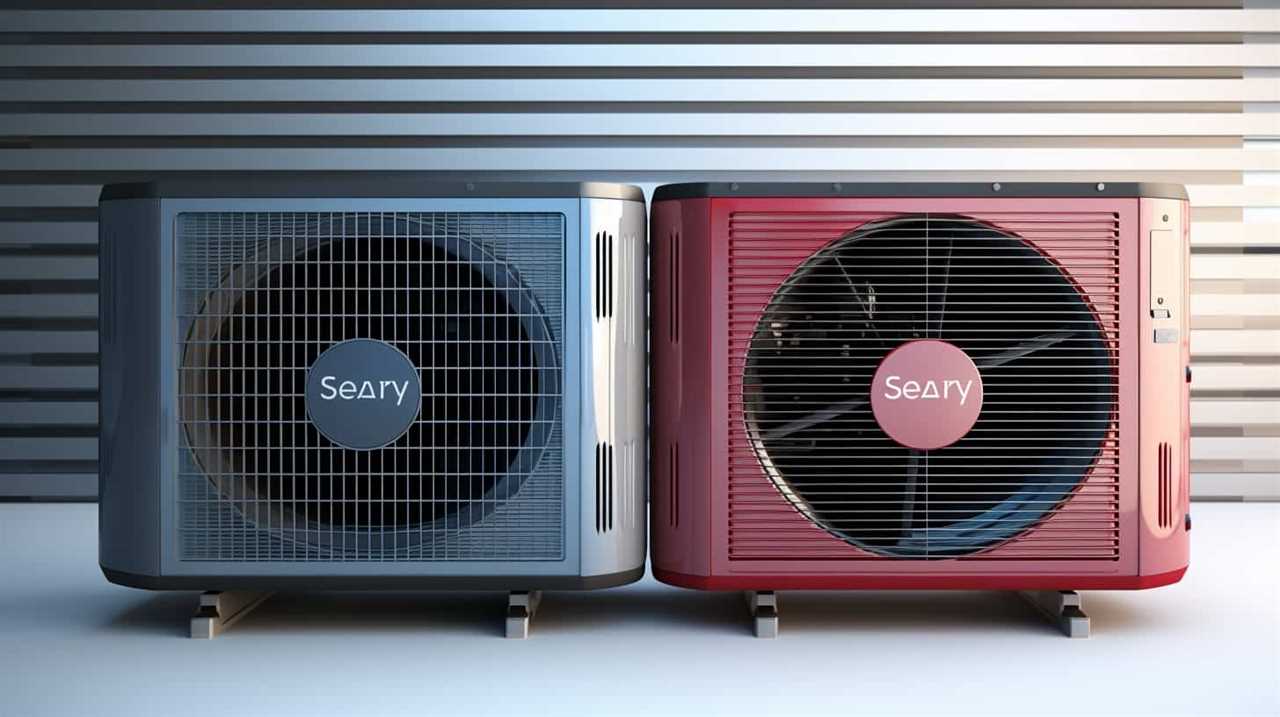
Can Heat Pumps Be Used in All Types of Climates or Are They More Suitable for Specific Regions?
Heat pumps can be used in all types of climates, but their efficiency may vary in extreme conditions. Some limitations include reduced performance in very cold regions and the need for additional heating sources.
Are There Any Government Incentives or Tax Credits Available for Installing Heat Pumps?
There are government incentives and tax credits available for installing heat pumps. These incentives can significantly reduce the upfront cost and make renewable energy more accessible to homeowners and businesses.
How Long Does It Typically Take for a Heat Pump to Pay for Itself in Terms of Energy Savings?
The heat pump payback period depends on various factors, including energy costs, climate, and insulation. It typically takes about 5-10 years for a heat pump to pay for itself in terms of energy savings.
Are There Any Maintenance Requirements or Recommended Practices to Ensure the Long-Term Efficiency of a Heat Pump?
To ensure long-term efficiency, heat pumps require regular maintenance and adherence to recommended practices. These include cleaning or replacing air filters, checking refrigerant levels, and inspecting electrical components. Neglecting these requirements can result in decreased performance and higher energy consumption.

Conclusion
In conclusion, renewable energy sources such as solar, geothermal, wind, biomass, and hydropower play a crucial role in boosting heat pump efficiency.
One interesting statistic to note is that harnessing solar energy can increase heat pump performance by up to 40%, while utilizing geothermal power can improve efficiency by up to 50%.
These renewable energy solutions not only provide sustainable alternatives to traditional heating methods but also contribute to a more energy-efficient and environmentally friendly future.
Thermal Energy Transfer
Decoding Heat Pumps’ Energy Efficiency Ratings: A Guide

Welcome to our guide on understanding the energy efficiency ratings of heat pumps! Have you ever been confused by the numbers and acronyms? We’re here to assist you.
In this article, we’ll break down the importance of energy efficiency ratings, how they’re calculated, and the key metrics to look out for.
We’ll also provide tips on maximizing your heat pump’s performance.
So, let’s dive in and uncover the secrets to choosing the most efficient heat pump for your needs.
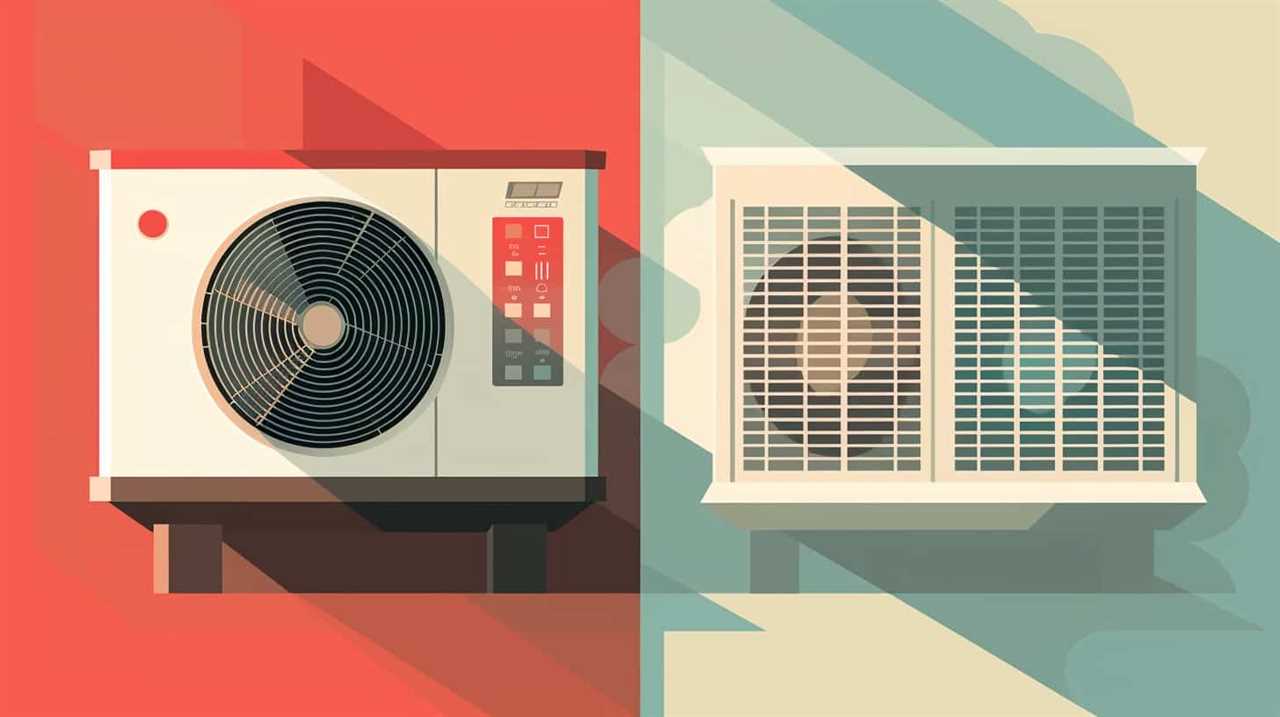
Key Takeaways
- Energy efficiency ratings are important in determining the effectiveness and cost savings of heat pumps.
- Higher efficiency ratings indicate lower energy consumption and can lead to reduced energy bills.
- Heat pumps with higher efficiency ratings often qualify for rebates and incentives.
- Evaluating energy efficiency ratings helps in making informed decisions and maximizing the benefits of heat pumps.
The Importance of Energy Efficiency Ratings in Heat Pumps
We believe that energy efficiency ratings play a crucial role in determining the effectiveness of heat pumps. When evaluating energy savings and long-term cost benefits, it’s important to consider the efficiency rating of a heat pump.
An energy efficiency rating provides a measure of how effectively a heat pump converts electricity into heat. Higher efficiency ratings indicate that the heat pump is more efficient in converting energy, resulting in lower energy consumption and ultimately, cost savings.
By choosing a heat pump with a high energy efficiency rating, homeowners can reduce their energy bills and minimize their environmental impact. Additionally, heat pumps with higher efficiency ratings often qualify for rebates and incentives, further enhancing the long-term cost benefits.
Evaluating energy efficiency ratings is therefore essential in making informed decisions and maximizing the benefits of heat pump technology.

How Energy Efficiency Ratings Are Calculated for Heat Pumps
To determine the energy efficiency rating of a heat pump, manufacturers use standardized testing procedures to measure its performance and calculate the ratio of heat output to electricity input. This calculation process takes into account various factors that affect the efficiency of the heat pump.
Here are some of the factors considered:
- Seasonal Energy Efficiency Ratio (SEER): This measures the cooling efficiency of the heat pump during the cooling season.
- Heating Seasonal Performance Factor (HSPF): This measures the heating efficiency of the heat pump during the heating season.
- Coefficient of Performance (COP): This measures the overall efficiency of the heat pump by considering both the cooling and heating modes.
Understanding SEER and HSPF: Key Energy Efficiency Metrics for Heat Pumps
SEER and HSPF are important energy efficiency metrics that help consumers understand the performance of heat pumps.
When it comes to evaluating the energy efficiency of heat pumps, it’s essential to understand the differences between SEER and HSPF ratings.

SEER, or Seasonal Energy Efficiency Ratio, measures the cooling efficiency of the heat pump. It calculates the amount of cooling output divided by the energy input over a cooling season. The higher the SEER rating, the more energy-efficient the heat pump is in cooling mode.
On the other hand, HSPF, or Heating Seasonal Performance Factor, measures the heating efficiency of the heat pump. It calculates the amount of heating output divided by the energy input over a heating season. A higher HSPF rating indicates better heating efficiency.
Both SEER and HSPF ratings are important when evaluating the energy efficiency of heat pumps. The choice between the two depends on the climate and the specific heating and cooling needs of the consumer. In warmer climates, where cooling demands are higher, SEER rating becomes more important. In colder climates, where heating demands are higher, HSPF rating is more significant.
To make an informed decision, it’s crucial to consider both SEER and HSPF ratings in order to choose a heat pump that meets your specific energy efficiency needs.

Comparing Energy Efficiency Ratings: What to Look for in Heat Pump Models
When comparing energy efficiency ratings, it’s important to regularly and carefully examine the different features of heat pump models. Here are three key aspects to consider when evaluating energy efficiency in heat pump models:
-
Seasonal Energy Efficiency Ratio (SEER): This rating measures the cooling efficiency of the heat pump. Look for a higher SEER rating, as it indicates better energy efficiency and lower operating costs during the cooling season.
-
Heating Seasonal Performance Factor (HSPF): HSPF measures the heating efficiency of the heat pump. A higher HSPF rating means better energy efficiency and lower heating costs during the heating season.
-
Energy Star Certification: Look for heat pump models that have earned the Energy Star certification. These models meet strict energy efficiency guidelines set by the Environmental Protection Agency (EPA) and can help you save on energy usage and costs.
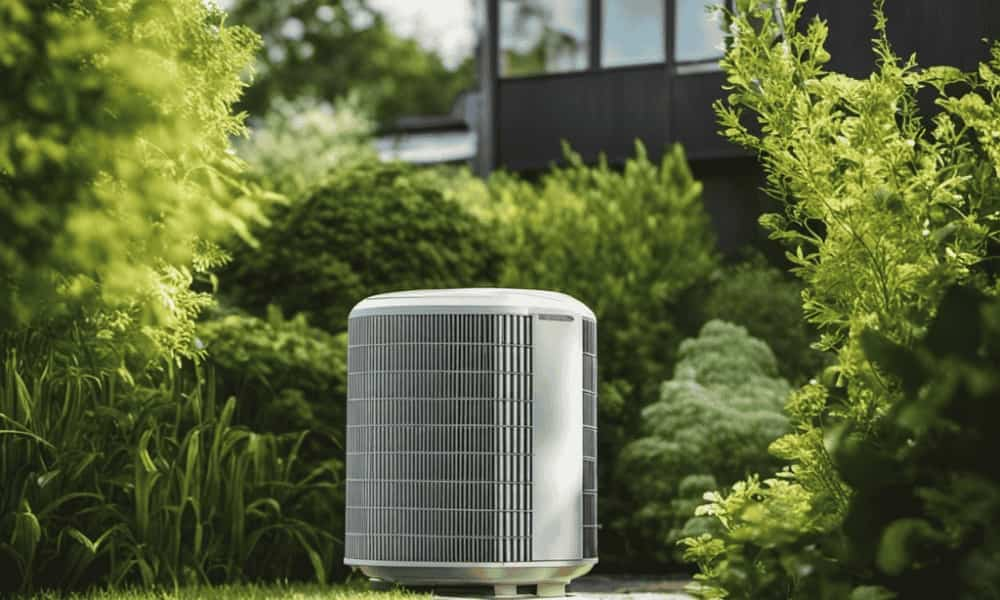
By considering these factors, you can make an informed decision when selecting a heat pump model that prioritizes energy efficiency.
In the next section, we’ll explore tips for maximizing energy efficiency and improving heat pump performance.
Maximizing Energy Efficiency: Tips for Improving Heat Pump Performance
To ensure that we get the most out of our heat pump and maximize its energy efficiency, we should implement these tips for improving its performance. First, regular maintenance is crucial for optimal operation. This includes cleaning or replacing air filters, inspecting and cleaning coils, and checking refrigerant levels. By keeping our heat pump in top condition, we can ensure that it operates efficiently and effectively. Additionally, optimizing the settings on our heat pump can make a significant difference in energy efficiency. Adjusting the thermostat to an appropriate temperature and utilizing programmable settings can help reduce energy consumption. It is also important to consider the size and placement of our heat pump, as these factors can impact its efficiency. By following these tips, we can improve the performance of our heat pump and save on energy costs.
| Tips for Improving Heat Pump Performance |
|---|
| Regular maintenance such as cleaning or replacing air filters, inspecting and cleaning coils, and checking refrigerant levels. |
| Optimizing settings on the heat pump, adjusting the thermostat to an appropriate temperature, and utilizing programmable settings. |
| Considering the size and placement of the heat pump to ensure maximum efficiency. |
Frequently Asked Questions
Are All Heat Pumps Required to Have an Energy Efficiency Rating?
Yes, all heat pumps are required to have an energy efficiency rating. Government regulations and industry standards mandate the inclusion of this rating to provide consumers with information about the product’s energy efficiency performance.
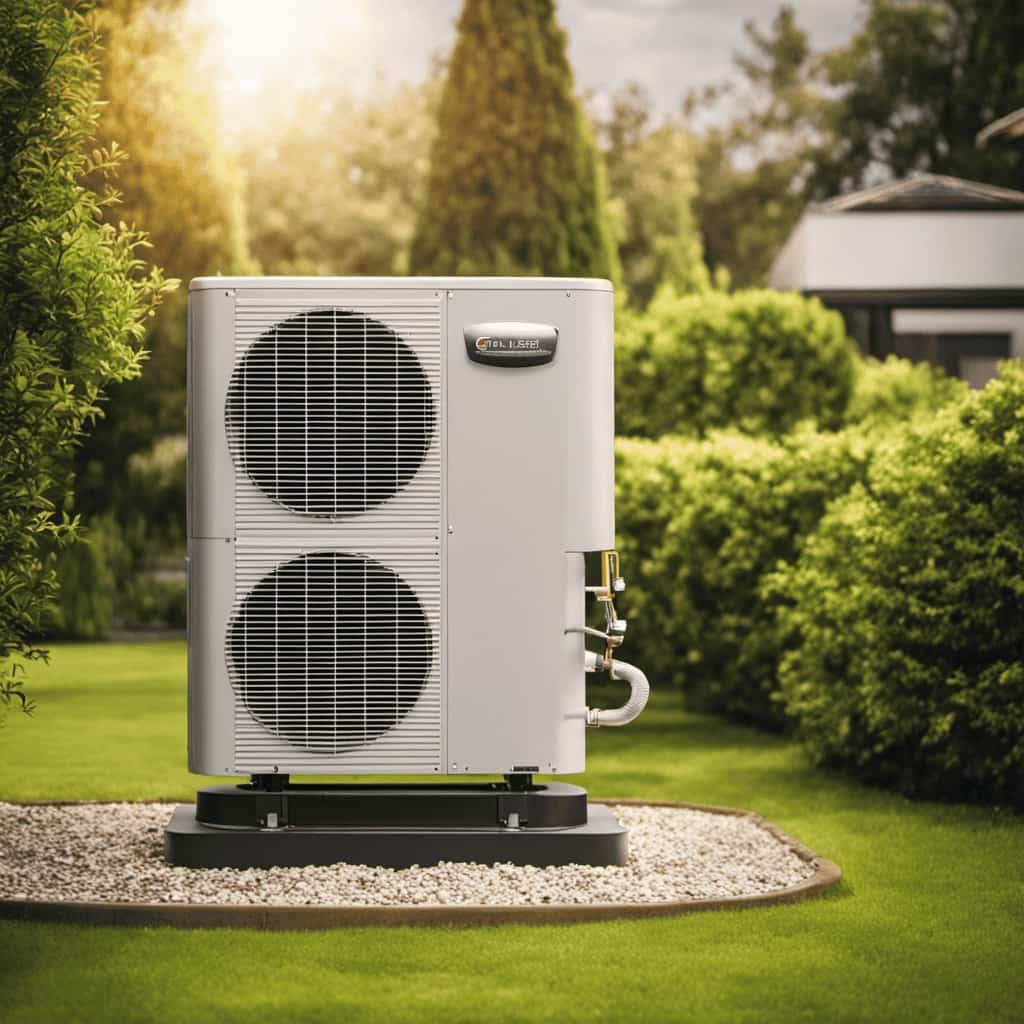
Can the Energy Efficiency Rating of a Heat Pump Change Over Time?
Yes, the energy efficiency rating of a heat pump can change over time due to various factors affecting efficiency. These factors include regular maintenance, age of the equipment, and advancements in technology.
How Can I Determine the Energy Efficiency Rating of My Existing Heat Pump?
To determine the energy efficiency rating of our existing heat pump, we can calculate the efficiency ratio by dividing the output heating or cooling energy by the input electrical energy.
Are There Any Government Incentives or Rebates Available for Purchasing a High-Efficiency Heat Pump?
Yes, there are government incentives and heat pump rebates available for purchasing a high-efficiency heat pump. These incentives and rebates can help reduce the cost and make it more affordable for homeowners to upgrade their heating systems.
Does the Location or Climate Affect the Energy Efficiency Rating of a Heat Pump?
In certain climates, heat pump efficiency ratings can be affected by the location. Additionally, proper installation is crucial for maximizing efficiency. These factors highlight the importance of considering climate and installation when evaluating a heat pump’s energy efficiency.

Conclusion
In conclusion, understanding energy efficiency ratings is crucial when evaluating heat pump options. By decoding SEER and HSPF metrics, consumers can make informed decisions that align with their energy-saving goals.
Comparing ratings and considering tips for maximizing efficiency ensures optimal performance.
Just as a skilled conductor coordinates an orchestra to create a harmonious symphony, homeowners who choose a heat pump with high energy efficiency ratings can enjoy a synchronized blend of comfort and cost savings.
Thermal Energy Transfer
Sustainable Home Design: Heat Pump Systems Efficiency Revealed
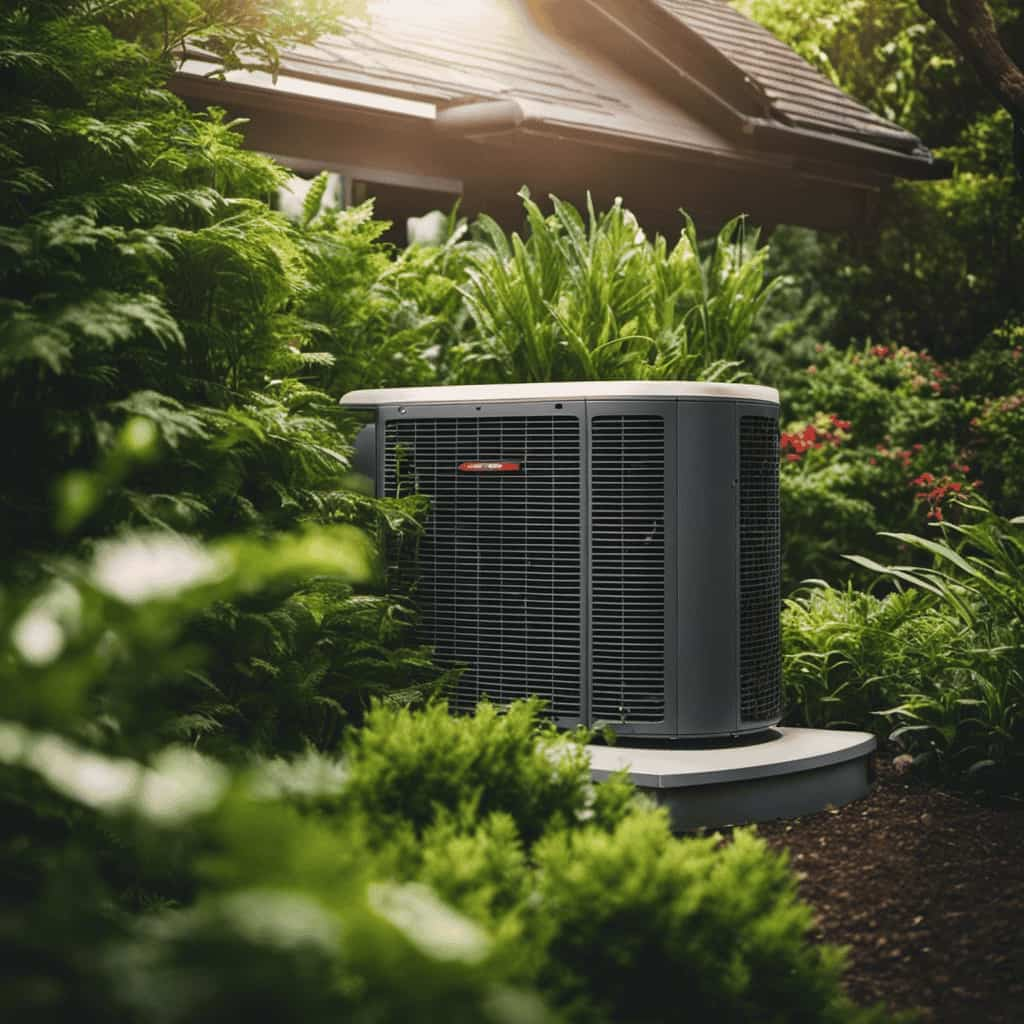
We believed we had a thorough understanding of sustainable home design, but our perspective changed when we learned about the impressive efficiency of heat pump systems.
In this article, we reveal the hidden benefits and secrets of these remarkable systems. From understanding energy efficiency ratings to tips for designing a sustainable home, we’ll guide you through the process of maximizing energy savings.
Prepare to be amazed by the innovations in heat pump technology that can transform your home into an eco-friendly haven.
Let’s dive into the world of heat pump systems and uncover their true potential.

Key Takeaways
- Heat pump systems significantly reduce energy consumption.
- Choosing a system with high SEER and HSPF ratings ensures maximum energy efficiency.
- Proper insulation and optimal system sizing are crucial for efficient heating and cooling.
- Regular maintenance helps maintain optimal system performance and energy efficiency.
The Benefits of Heat Pump Systems in Sustainable Home Design
One of the key benefits of heat pump systems in sustainable home design is that they can significantly reduce energy consumption. This advantage is especially important in today’s world, where energy efficiency is a top priority. By using heat pump systems, homeowners can lower their energy bills and reduce their carbon footprint.
Case studies have shown that these systems can achieve energy savings of up to 50% compared to traditional heating and cooling methods. Additionally, heat pump systems provide both heating and cooling capabilities, eliminating the need for separate systems and saving space.
They also offer precise temperature control and can be easily integrated with renewable energy sources such as solar panels. Overall, heat pump systems are a practical and efficient choice for sustainable home design.
Understanding Energy Efficiency Ratings for Heat Pump Systems
When it comes to understanding energy efficiency ratings for heat pump systems, we need to consider factors such as the Seasonal Energy Efficiency Ratio (SEER) and the Heating Seasonal Performance Factor (HSPF). These ratings are important in evaluating the performance of a heat pump system.

The SEER measures the cooling efficiency of the system during the cooling season, while the HSPF measures the heating efficiency during the heating season. Higher SEER and HSPF ratings indicate greater energy efficiency, which means lower energy consumption and cost savings.
It’s crucial to consider these ratings when choosing a heat pump system for your sustainable home. By opting for a system with high SEER and HSPF ratings, you can ensure maximum energy efficiency and reduce your environmental impact.
In the next section, we’ll discuss tips and considerations for designing a sustainable home with heat pump systems.
Designing a Sustainable Home With Heat Pump Systems: Tips and Considerations
To maximize the energy efficiency of our sustainable home, we should consider various tips and considerations when designing it with heat pump systems. Here are three key factors to keep in mind:

-
Proper insulation: Insulating your home effectively is crucial for reducing heat loss and ensuring that your heat pump system operates efficiently. Insulate walls, floors, and roofs to minimize heat transfer and maintain a comfortable indoor temperature.
-
Optimal system sizing: It’s important to choose the right size heat pump system for your home. Oversized systems can lead to inefficient operation, while undersized systems may struggle to meet your heating and cooling needs. Work with a professional to determine the appropriate size for your specific requirements.
-
Renewable energy integration: Consider integrating renewable energy sources, such as solar panels or wind turbines, with your heat pump system. This allows you to harness clean energy and further reduce your carbon footprint.
Maximizing Energy Savings Through Proper Heat Pump System Sizing
To maximize our energy savings, we need to ensure that our heat pump system is properly sized for our home. A heat pump that is too small will struggle to heat or cool our space efficiently, while a system that is too large will cycle on and off frequently, leading to increased energy consumption and wear and tear on the equipment. Proper heat pump sizing involves considering factors such as the size and layout of our home, insulation levels, and climate conditions. Consulting with a professional during the heat pump installation process is crucial to ensure accurate sizing. Additionally, regular heat pump maintenance, including cleaning filters and checking refrigerant levels, will help maintain optimal system performance and energy efficiency.
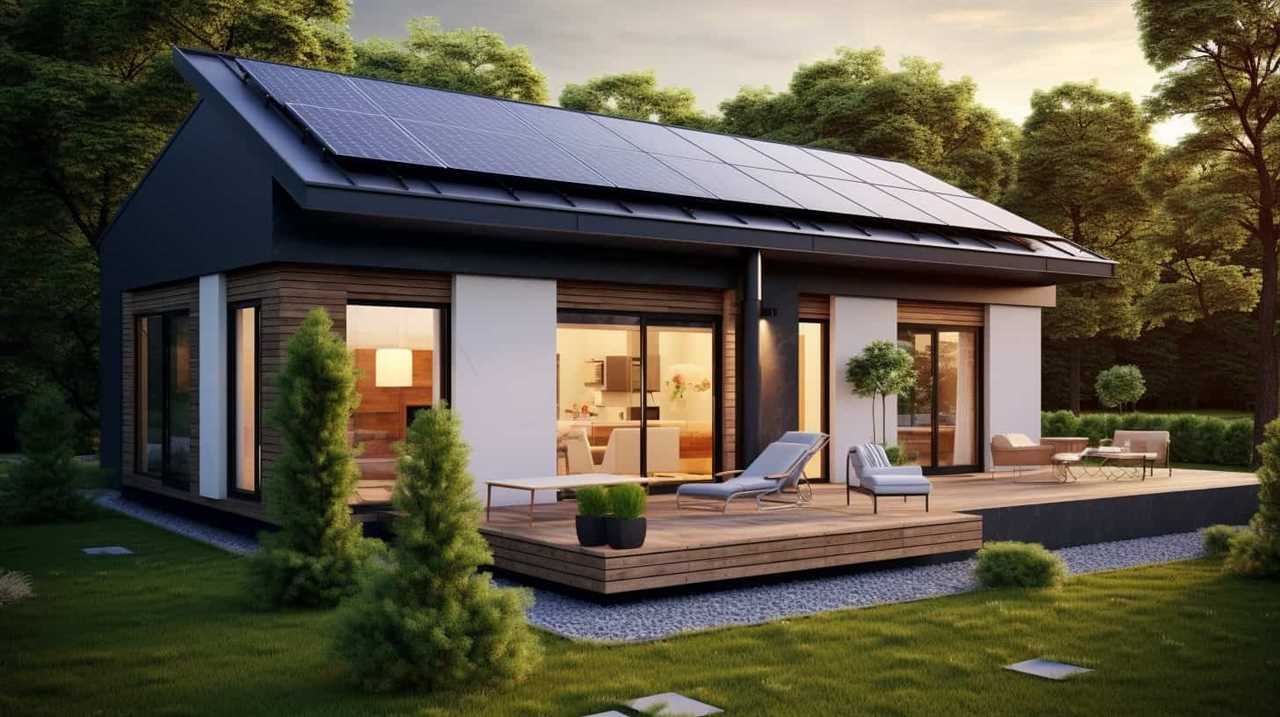
| Factors to Consider for Proper Heat Pump Sizing | |
|---|---|
| Size and layout of our home | Insulation levels |
| Climate conditions | |
| Consultation with a professional during installation | Regular heat pump maintenance |
Innovations in Heat Pump Technology for Sustainable Home Design
We have witnessed remarkable advancements in heat pump technology, revolutionizing sustainable home design. These innovations have brought about significant improvements in the efficiency and performance of heat pump systems, making them an increasingly attractive option for homeowners looking to integrate renewable energy sources into their homes.
Here are three key advancements in heat pump technology:
-
Variable speed compressors: These allow heat pumps to adjust their speed based on the heating or cooling needs of a home, resulting in more precise temperature control and increased energy efficiency.
-
Improved refrigerants: Newer heat pumps use environmentally friendly refrigerants that have a lower impact on the ozone layer and contribute less to global warming.

-
Smart controls and connectivity: Heat pumps now come equipped with smart thermostats and connectivity features, allowing homeowners to remotely control and monitor their systems, optimizing energy usage and reducing costs.
With these advancements, heat pump systems are now a reliable and efficient solution for sustainable home design, offering homeowners the opportunity to reduce their carbon footprint and save on energy bills.
Frequently Asked Questions
Are Heat Pump Systems Suitable for All Types of Homes, or Are There Specific Requirements?
Heat pump systems can be suitable for most homes, but specific requirements, such as adequate insulation and proper sizing, should be met. Consider heat pump system installation costs and the environmental impact when deciding on sustainability.
How Long Do Heat Pump Systems Typically Last Before Needing to Be Replaced?
Heat pump systems typically last around 15-20 years before needing replacement. Factors that affect their lifespan include proper maintenance, usage patterns, and the quality of the system’s components.
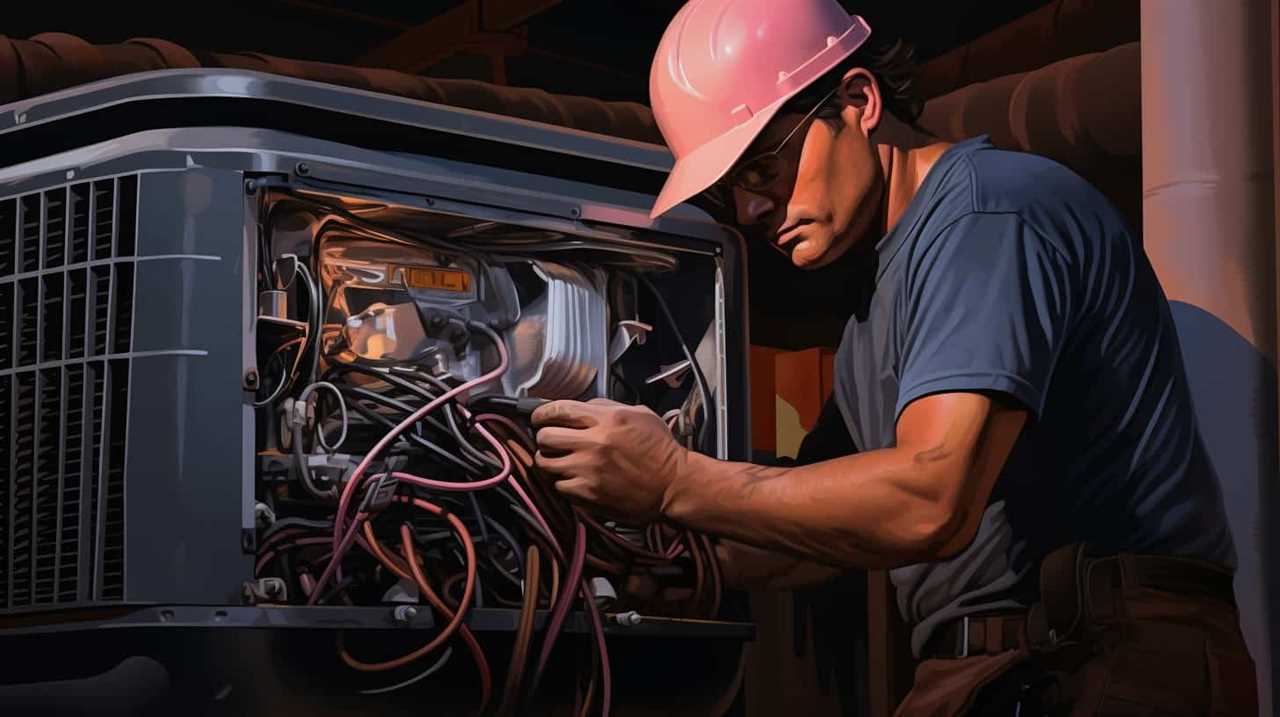
Can Heat Pump Systems Be Used for Both Heating and Cooling Purposes?
Yes, heat pump systems can be used for both heating and cooling purposes. They offer efficient temperature control in our homes. The benefits of using these systems include energy savings and a comfortable living environment.
Are There Any Government Incentives or Rebates Available for Homeowners Who Choose to Install Heat Pump Systems?
Government incentives and rebates are available for homeowners who install heat pump systems. These incentives are designed to encourage energy savings and make sustainable home design more accessible and affordable for everyone.
Are There Any Maintenance Requirements or Costs Associated With Heat Pump Systems?
Maintaining heat pump systems requires regular maintenance to ensure optimal performance. Costs associated with maintenance include filter replacements, annual inspections, and occasional repairs. However, these costs are outweighed by the long-term energy savings and environmental benefits.
Conclusion
In conclusion, heat pump systems are a symbol of efficiency and sustainability in home design.

Their energy efficiency ratings and innovative technology make them a practical choice for those seeking to reduce their environmental impact.
By properly sizing the system and considering tips for sustainable design, homeowners can maximize energy savings and create a comfortable living space.
So, let’s embrace the power of heat pump systems and build a greener future for our homes.
-

 Residential and Commercial Applications3 months ago
Residential and Commercial Applications3 months agoBest Amana Heat Pump Reviews
-

 Thermal Energy Transfer3 months ago
Thermal Energy Transfer3 months agoBreakthroughs in Modern Heat Pump Systems: Thermal Energy Edition
-

 Residential and Commercial Applications3 months ago
Residential and Commercial Applications3 months agoBest Heat Pump
-

 Geothermal Heat Pumps2 months ago
Geothermal Heat Pumps2 months agoUpgrade Your Comfort with Our Efficient HVAC Systems
-

 Geothermal Heat Pumps2 months ago
Geothermal Heat Pumps2 months agoInnovative Geothermal Heat Pump Manufacturers Revolutionize Energy Efficiency
-

 Air Conditioning4 weeks ago
Air Conditioning4 weeks agoExploring Energy-Efficient Air Conditioning Heat Pumps
-

 Residential and Commercial Applications3 months ago
Residential and Commercial Applications3 months agoBest Portable Heat Pump Heat & AC
-

 Air Conditioning2 months ago
Air Conditioning2 months agoHeat Pumps Outperform Traditional Heating in Energy Use











